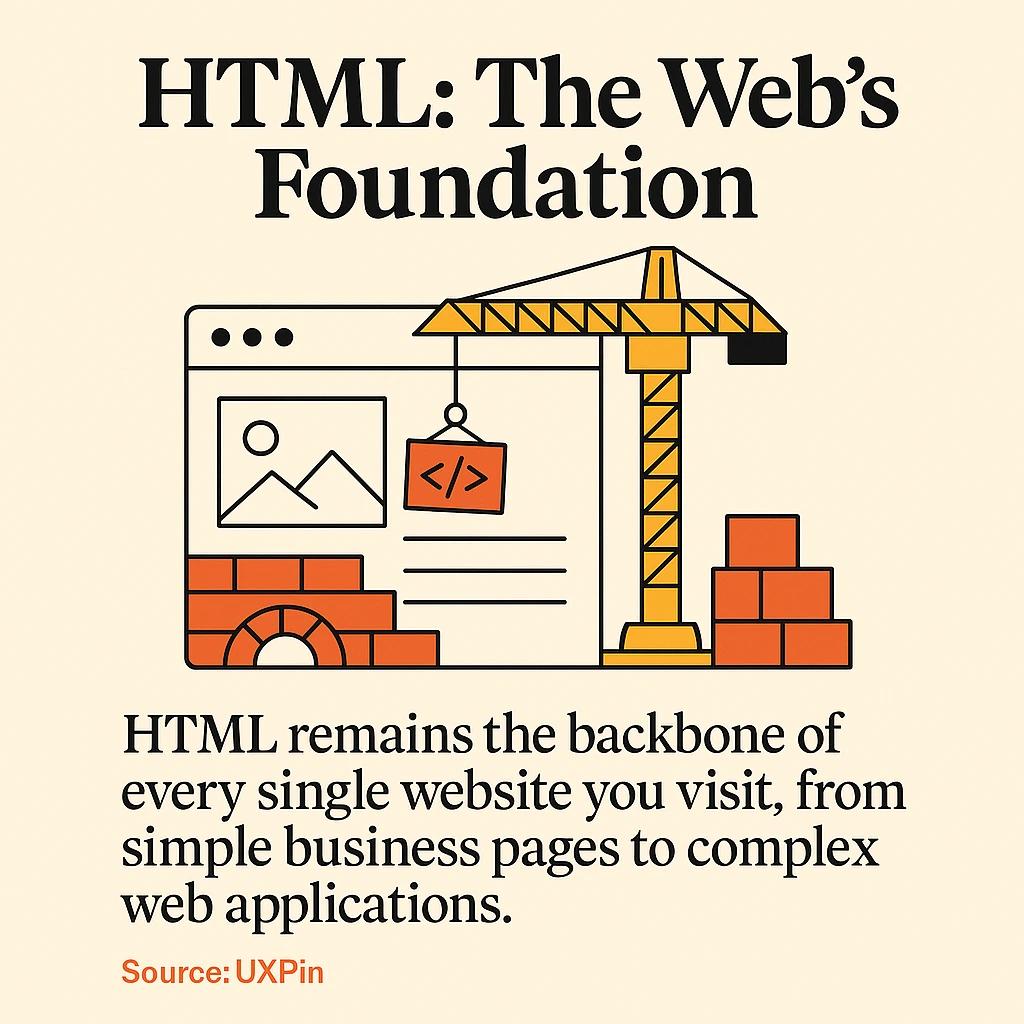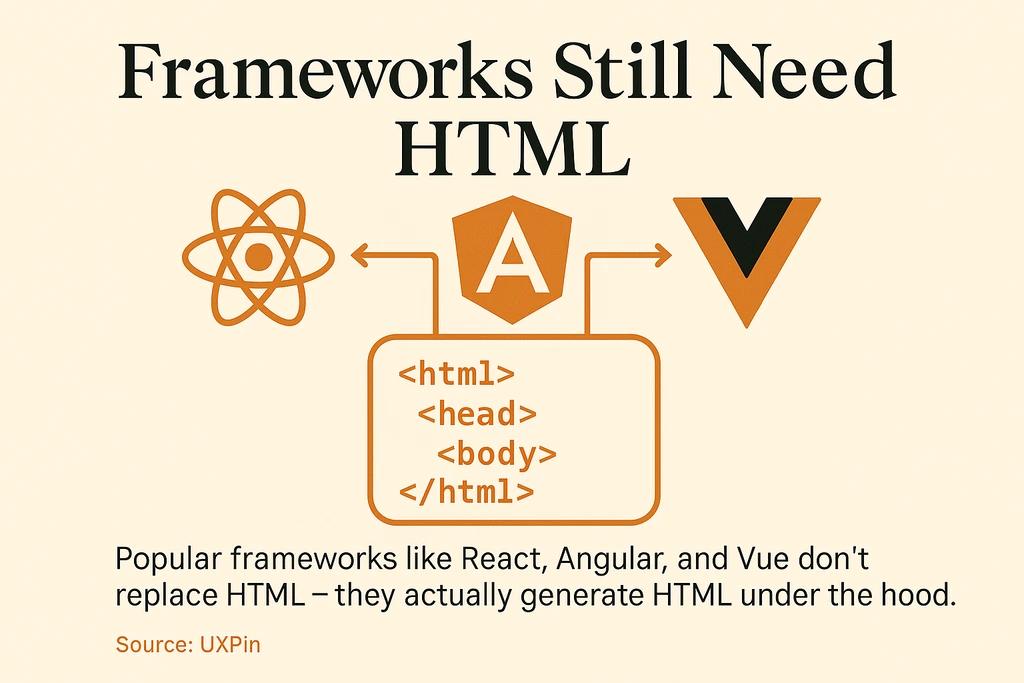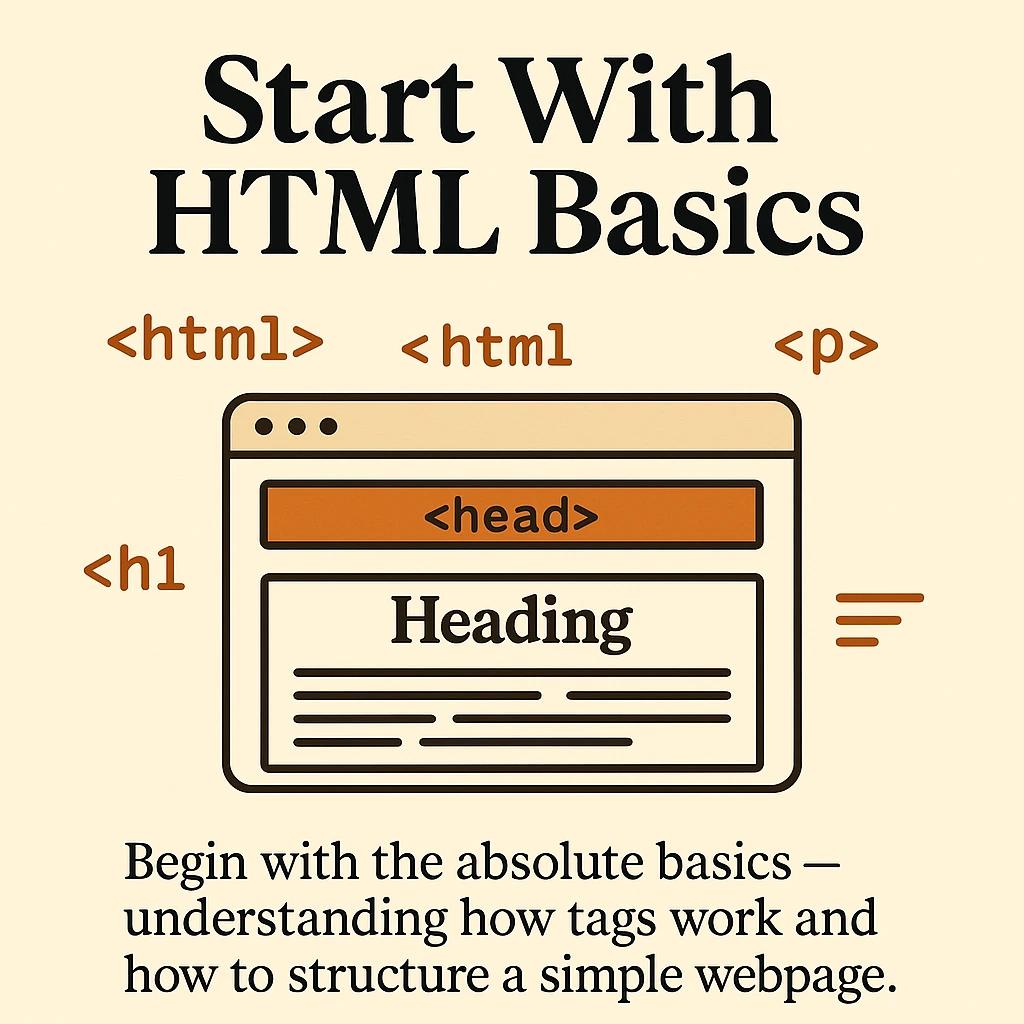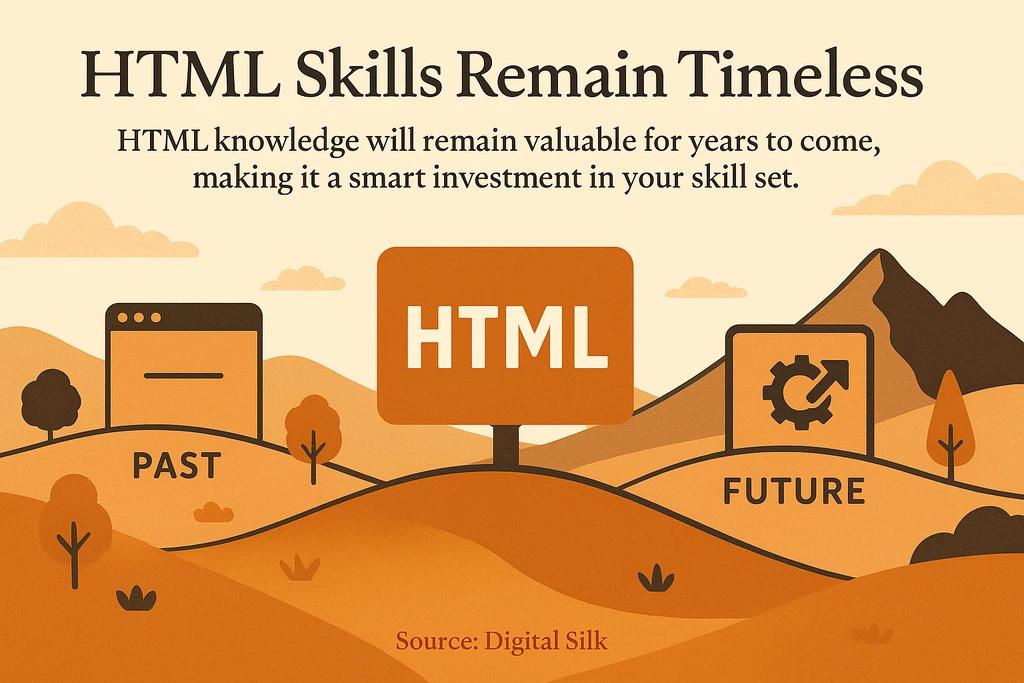Is HTML Still Relevant in Web Development?

You're thinking about learning web development, and someone just told you HTML is "old school" or "not worth your time." We get it – with all the fancy frameworks and tools out there, it's easy to wonder if good old HTML is still pulling its weight. Here's the thing: HTML isn't just alive and kicking, it's absolutely essential for anyone serious about building websites that actually work.
Whether you're a real estate professional looking to showcase your properties online or a complete beginner trying to figure out where to start, understanding HTML's current role will save you from making costly mistakes. Modern web development might look different than it did ten years ago, but HTML remains the foundation everything else is built on.
We'll walk you through exactly why HTML is still crucial, how it plays with modern frameworks, what the job market looks like, and give you a clear roadmap for learning it effectively. By the end, you'll know exactly where HTML fits in your web development journey – and why skipping it would be a huge mistake.

HTML's Role in Modern Web Development
HTML remains the backbone of every single website you visit, from simple business pages to complex web applications. Despite what you might hear about "modern" development, HTML provides the semantic structure that makes websites accessible, SEO-friendly, and compatible across all browsers (Source: UXPin).
Think of HTML as the skeleton of your website – you can dress it up with CSS styling and add JavaScript functionality, but without proper HTML structure, everything falls apart. This is especially important for real estate websites where you need clean, organized content that search engines can understand and visitors can navigate easily.
The evolution of HTML5 brought features like responsive design support and multimedia integration, keeping the language current with modern user expectations. These updates mean HTML isn't just surviving – it's thriving by enabling the interactive experiences users expect today (Source: UXPin).
<header>
- Purpose: Page header content
- Real Estate Example: Company logo and navigation
<section>
- Purpose: Content sections
- Real Estate Example: Property listings area
<article>
- Purpose: Standalone content
- Real Estate Example: Individual property details
<aside>
- Purpose: Sidebar content
- Real Estate Example: Contact information or featured properties

How HTML Works with Modern Frameworks
Here's where things get interesting – popular frameworks like React, Angular, and Vue don't replace HTML. They actually generate HTML under the hood or require you to write HTML-like syntax. React uses JSX, which looks almost identical to HTML, while Vue uses template syntax that's essentially HTML with special attributes (Source: UXPin).
Even modern website builders like Webflow rely heavily on HTML fundamentals. When you're building custom websites with these tools, understanding HTML helps you create cleaner, more maintainable code that your clients will thank you for later.
The principle of progressive enhancement – starting with solid HTML before adding CSS and JavaScript – remains a best practice for cross-browser compatibility and accessibility. This approach ensures your real estate listings work perfectly whether someone's browsing on their phone or using assistive technology (Source: MDN Web Docs).
Framework Integration Examples
Let's look at how HTML integrates with different frameworks commonly used in modern web development:
React
- HTML Usage: JSX syntax (HTML-like)
- Learning Requirement: HTML knowledge essential
Vue.js
- HTML Usage: Template syntax with HTML
- Learning Requirement: HTML knowledge essential
Angular
- HTML Usage: Templates with HTML
- Learning Requirement: HTML knowledge essential
Webflow
- HTML Usage: Visual editor generates HTML
- Learning Requirement: HTML knowledge helpful

Career Prospects and Learning Value
The job market data tells a clear story: virtually every web developer role expects HTML proficiency because it underpins both traditional websites and single-page applications. According to recent statistics, 71% of U.S. web developers have at least a bachelor's degree, but continuous learning – including mastering foundational skills like HTML – remains crucial for career growth (Source: Digital Silk).
For real estate professionals looking to build their own websites or work with developers, understanding HTML basics helps you communicate your needs clearly and spot potential issues before they become expensive problems. You don't need to become a coding expert, but knowing the fundamentals gives you confidence in your digital presence.
The beauty of HTML is that it's relatively easy to learn compared to programming languages. Once you understand the basics, you can start building functional websites and gradually add more advanced features. This makes it perfect for busy professionals who need practical skills without spending months in bootcamps.
Market Demand Analysis
Current job market trends show consistent demand for HTML skills across various roles:
Front-end Developer
- HTML Requirement: Essential
- Salary Impact: Foundation for higher pay
Full-stack Developer
- HTML Requirement: Essential
- Salary Impact: Required for complete skill set
Web Designer
- HTML Requirement: Highly beneficial
- Salary Impact: Increases project value
Digital Marketer
- HTML Requirement: Beneficial
- Salary Impact: Enables better campaign execution

Learning HTML: Your Step-by-Step Roadmap
If you're ready to start learning HTML, here's a practical approach that won't overwhelm you. Begin with the absolute basics – understanding how tags work and how to structure a simple webpage. This foundation will serve you well whether you're planning to build your own real estate website or just want to understand how the web works.
Start with these essential elements that you'll use constantly:
- Basic tags: headings (<h1>–<h6>), paragraphs (<p>), links (<a>), images (<img>)
- Document structure: <html>, <head>, <body>, and essential metadata
- Semantic elements: <header>, <nav>, <main>, <section>, <article>, <footer>
- Forms: input fields (<input>), labels (<label>), buttons (<button>)
- How CSS connects to your HTML for styling and layout
The great news is that HTML isn't actually considered a programming language – it's a markup language, which makes it much more approachable for beginners. You can learn the basics in a few weeks and start building real websites surprisingly quickly. For more details on this distinction, check out our guide on why HTML is not considered a programming language.
Learning Resources and Timeline
Here's a realistic timeline for learning HTML effectively:
Week 1-2
- Skills to Master: Basic tags and structure
- Practical Application: Simple one-page website
Week 3-4
- Skills to Master: Forms and semantic elements
- Practical Application: Contact page with form
Week 5-6
- Skills to Master: CSS integration
- Practical Application: Styled multi-page site
Week 7-8
- Skills to Master: Best practices and accessibility
- Practical Application: Professional-quality website
If you're wondering whether HTML is difficult to learn, we've got you covered with our detailed guide on is HTML hard to learn. Spoiler alert: it's much easier than you might think!
HTML vs. Alternatives: Making the Right Choice
You might be wondering if there are alternatives to HTML that could serve your needs better. The short answer is: not really. While technologies like Markdown exist for simple documentation, they're not suitable for building real websites or applications. Even when you use Markdown, it typically gets converted to HTML behind the scenes.
Content Management Systems like WordPress generate HTML dynamically, but they still output standard HTML that browsers can understand. This means even if you're using a CMS, understanding HTML helps you customize and troubleshoot your site more effectively.
Here's how HTML compares to other markup options:
HTML
- Best Use Case: All websites and web apps
- Can Replace HTML?: N/A (it's the standard)
- Learning Difficulty: Beginner-friendly
Markdown
- Best Use Case: Documentation and blogs
- Can Replace HTML?: No
- Learning Difficulty: Very easy
JSX
- Best Use Case: React applications
- Can Replace HTML?: No (compiles to HTML)
- Learning Difficulty: Requires HTML knowledge
XML
- Best Use Case: Data exchange
- Can Replace HTML?: No
- Learning Difficulty: Similar to HTML

Future Outlook: HTML's Staying Power
Looking ahead, HTML's future looks bright. As new technologies like virtual reality and augmented reality become more mainstream, the need for solid, accessible markup becomes even more important. These emerging platforms still depend on structured content delivered through standardized formats (Source: Digital Silk).
The web standards continue to evolve, but they build on HTML's foundation rather than replacing it. This means your HTML knowledge will remain valuable for years to come, making it a smart investment in your skill set.
For real estate professionals, this stability is particularly valuable. You can build your digital presence on HTML fundamentals knowing that your investment in learning won't become obsolete in a few years. The same basic principles you learn today will still apply when you're ready to expand your online presence.
Integration with Modern Development
HTML continues to integrate seamlessly with modern development practices. When you're ready to add more advanced features to your website, understanding HTML makes it easier to work with CSS frameworks and JavaScript libraries. Our guide on best CSS frameworks for beginners shows how HTML knowledge enhances your ability to use these tools effectively.
The connection between HTML and other web technologies becomes especially important when you're building custom solutions. Whether you're integrating with backend systems or adding interactive features, HTML provides the structure that makes everything else possible. To understand how this fits into the bigger picture, check out our article on how JavaScript works.
Ready to Start Your HTML Journey?
HTML isn't just still relevant – it's absolutely essential for anyone serious about web development. Whether you're building your first website or planning to work with developers, HTML knowledge gives you the foundation you need to succeed online.
The best part? HTML is one of the most beginner-friendly technologies you can learn. You can start building real websites within weeks, not months. And unlike many programming languages that become obsolete, HTML skills will serve you for decades to come.
Don't let anyone tell you HTML is outdated. It's the foundation of the web, and understanding it will make you a better developer, a smarter business owner, and a more confident participant in the digital world. Ready to get started? The web is waiting for what you'll build next.
If you're planning to expand your web development skills beyond HTML, our guide on best programming languages to learn can help you map out your next steps. But HTML? That's where every successful web developer's journey begins.




